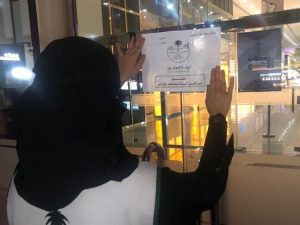Foodborne diseases are usually caused by consuming foods that are stored at an inappropriate temperature. This study aims to evaluate the knowledge of safe food temperature control among restaurant supervisors of Dammam city, Saudi Arabia.
 A cross-sectional study was carried out during January 2019 to May 2019. A close-ended questionnaire was used to assess knowledge and source of information about food temperature control from restaurant supervisors. The response rate of the study was 97 (80.8%). Demographic profile and knowledge scores of restaurant supervisors are reported as percentage. Chi-square test was used to compare group differences in knowledge. value <0.05 was considered significant. Restaurant supervisors had good knowledge about safe temperature for cold food (93.8%) and storing food in the freezer (83.5%) and in the refrigerator (79.4%), while they had poor knowledge of safe temperature for hot food (14.4%) and the range of temperature in which bacteria grow rapidly (danger zone temperature) in food (15.5%). All restaurant supervisors reported food and environmental inspector as their main source of information about food temperature control. Restaurant supervisors’ education level and place of work showed a significant association with safe temperature for storing food in the refrigerator and the best method to check safe cooking temperature (I have one of those, upper right, in my knapsack, which I take everywhere).
A cross-sectional study was carried out during January 2019 to May 2019. A close-ended questionnaire was used to assess knowledge and source of information about food temperature control from restaurant supervisors. The response rate of the study was 97 (80.8%). Demographic profile and knowledge scores of restaurant supervisors are reported as percentage. Chi-square test was used to compare group differences in knowledge. value <0.05 was considered significant. Restaurant supervisors had good knowledge about safe temperature for cold food (93.8%) and storing food in the freezer (83.5%) and in the refrigerator (79.4%), while they had poor knowledge of safe temperature for hot food (14.4%) and the range of temperature in which bacteria grow rapidly (danger zone temperature) in food (15.5%). All restaurant supervisors reported food and environmental inspector as their main source of information about food temperature control. Restaurant supervisors’ education level and place of work showed a significant association with safe temperature for storing food in the refrigerator and the best method to check safe cooking temperature (I have one of those, upper right, in my knapsack, which I take everywhere).
The high percentage of lack in the knowledge of safe temperature control for hot foods and danger zone temperature among restaurant supervisors is of great concern for public health as it exposes the customers to foodborne illnesses. The study results emphasize on the necessity to conduct education and training programs for restaurant supervisors to improve the quality of food served to consumers and protect them from foodborne illnesses and food poisoning.
Knowledge of safe food temperature among restaurant supervisors in Dammam, Saudi Arabia, 12 July 2021
Journal of Food Quality
Mohammed Al-Mohaithef,1 Syed Taha Abidi,2 Nargis Begum Javed,2 Musaad Alruwaili,2 and Amal Yousef Abdelwahed2,3








 drinks during 2011. The affected workers were barred from working at eateries until they recovered from infections. They were allowed to resume duty only after producing a fitness certificate from the Ministry of Health.
drinks during 2011. The affected workers were barred from working at eateries until they recovered from infections. They were allowed to resume duty only after producing a fitness certificate from the Ministry of Health. Amy also talks of the farm on Interstate-70 between Manhattan (Kansas) and Topeka where she would see a camel on the hill. I never saw the camel. But Amy told the story to enough people that she finally ran into one who knew of the Kansas camel, and said the farmer got rid of it.
Amy also talks of the farm on Interstate-70 between Manhattan (Kansas) and Topeka where she would see a camel on the hill. I never saw the camel. But Amy told the story to enough people that she finally ran into one who knew of the Kansas camel, and said the farmer got rid of it.